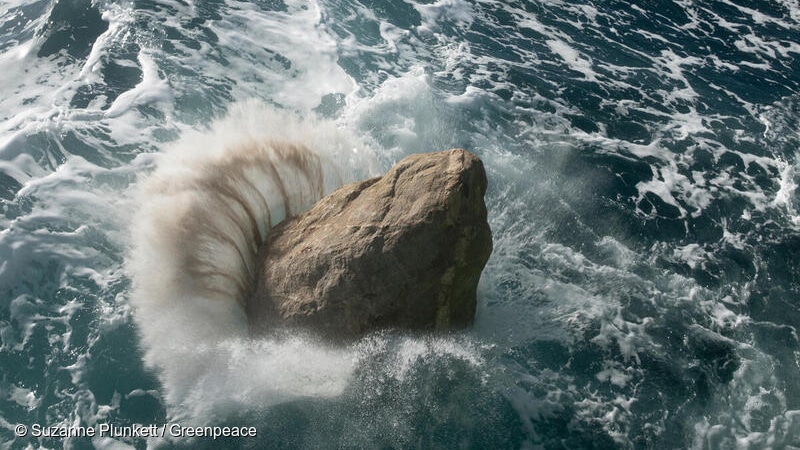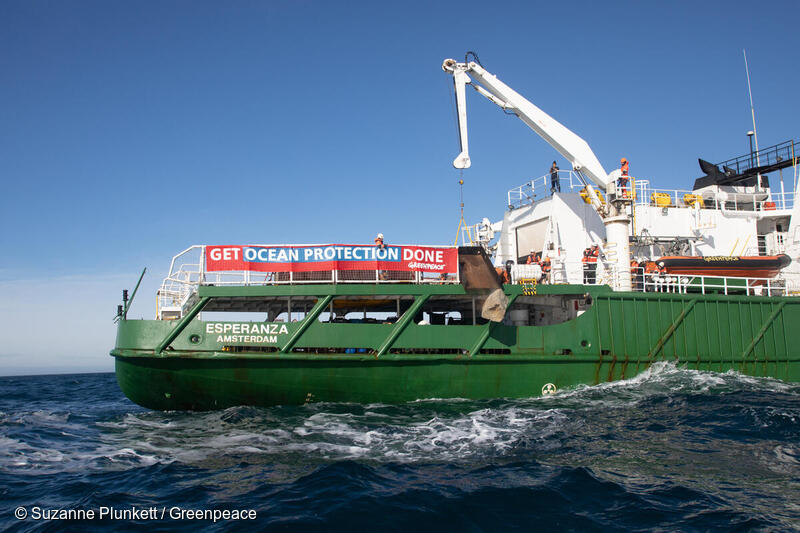Marine Life & Conservation
Greenpeace prosecuted over underwater boulder barrier

 Greenpeace in court this week after the Marine Management Organisation decided to prosecute Greenpeace over protecting nature by building an underwater boulder barrier.
Greenpeace in court this week after the Marine Management Organisation decided to prosecute Greenpeace over protecting nature by building an underwater boulder barrier.
The UK government’s Marine Management Organisation [MMO] is prosecuting Greenpeace UK and its Executive Director, John Sauven, over the creation of an underwater boulder barrier to stop destructive bottom trawling in the Offshore Brighton Marine Protected Area (MPA) in February 2021.
In response to Greenpeace’s underwater boulder barriers, the MMO has consulted on introducing bottom trawling restrictions in four protected areas, including the Dogger Bank where Greenpeace’s first underwater boulder barrier was built. They plan to consult on introducing limited bottom trawling restrictions across all 40 offshore English MPAs.
The Offshore Brighton MPA was established in 2016 specifically to protect the seabed, but in 2019 bottom trawlers spent 3,099 hours ploughing and destroying its seabed and another 448 fishing hours last year. The MMO’s prosecution against Greenpeace is for depositing boulders without a license under the Marine and Coastal Access Act 2009.
Stephen Fry, Ranulph Fiennes, Bonnie Wright and Mya Rose Craig, who all signed their names on to boulders, have penned an open letter to George Eustice, urging him to cease prosecution. Greenpeace’s boulders were signed by celebrities including Hugh Fearnley-Whittingstall, Thandiwe Newton, Mark Rylance, Jarvis Cocker, Robert Plant and others.

Inert granite boulders being placed into the English Channel as part of a bottom trawler exclusion zone in the Offshore Brighton Marine Protected Area.
John Sauven, Executive Director of Greenpeace UK, said “Our boulder barriers were absolutely necessary in the face of continued inaction from the Marine Management Organisation, which has failed to protect our oceans from industrial fishing. The organisation has ignored the science which clearly shows that fully protected areas at sea have the best ecological results. While we live through a climate and nature emergency, the Marine Management Organisation chooses to move at a snail’s pace and propose half measures to improve the UK’s failing network of protected areas at sea.
“It’s absurd that the Marine Management Organisation, which is supposed to protect our natural environment, is wasting public resources taking us to court for protecting our oceans and doing their job for them. Our boulder barriers have stopped bottom trawlers from further damaging our oceans and worsening the climate emergency. While the Marine Management Organisation continues to fail in its duties, we will do all we can to protect our oceans.”
Greenpeace UK has made representations to the MMO that the prosecution is not in the public interest. The MMO, instead of attacking Greenpeace and draining its resources for responsibly preventing environmental harm, should follow its remit and direct its own resources into doing its job to safeguard the UK’s seas for future generations.
Mr Sauven and Greenpeace UK will plead not guilty. Mr Sauven faces up to two years in jail if found guilty. A date for the full hearing of the case will be fixed by Newcastle Crown Court. The MMO will have an opportunity at the hearing to desist with the prosecution following representations from Greenpeace.
Bottom trawlers spent 68,000 hours ploughing UK protected areas in 2020. This damages habitats, harms biodiversity and disturbs vast stores of blue carbon which would otherwise remain safely in the seabed. Greenpeace, along with the Marine Conservation Society, revealed earlier this year that 26.5 million tonnes of carbon is stored in the seabed in the UK’s offshore protected areas alone.
Greenpeace’s experienced team acted within all necessary safety precautions and immediately notified the Maritime and Coastguard Agency of the coordinates of each boulder. Maritime traffic was notified by radio. The natural boulders are made of inert granite and placed at a safe depth. Their impact on the seabed was scientifically assessed in advance and was found to be negligible.
Greenpeace is calling on the UK government to ban destructive industrial fishing vessels, including bottom trawlers, supertrawlers and fly-shooters, from all of the UK’s protected areas as a matter of urgency. Currently there are few restrictions on industrial fishing in the overwhelming majority of the UK’s offshore marine protected areas.
For more information on Greenpeace UK visit their website by clicking here.
Blogs
Invitation from The Ocean Cleanup for San Francisco port call

6 years ago, The Ocean Cleanup set sail for the Great Pacific Garbage Patch with one goal: to develop the technology to be able to relegate the patch to the history books. On 6 September 2024, The Ocean Cleanup fleet returns to San Francisco bringing with it System 03 to announce the next phase of the cleanup of the Great Pacific Garbage Patch and to offer you a chance to view our cleanup system up-close and personal.
We look forward to seeing you there.
To confirm your presence, please RSVP to press@theoceancleanup.com
PROGRAM
Join The Ocean Cleanup as our two iconic ships and the extraction System 03 return to San Francisco, 6 years and over 100 extractions after we set sail, to create and validate the technology needed to rid the oceans of plastic.
Our founder and CEO, Boyan Slat, will announce the next steps for the cleanup of the Great Pacific Garbage Patch. Giving you a chance to view our cleanup system and the plastic extracted.
Hear important news on what’s next in the mission of The Ocean Cleanup as it seeks to make its mission of ridding the world’s oceans of plastic an achievable and realistic goal.
Interviews and vessel tours are available on request.
PRACTICALITIES
Date: September 6, 2024
Press conference: 12 pm (noon)
Location: The Exploratorium (Google Maps)
Pier 15 (Embarcadero at Green Street), San Francisco, CA
Parking: Visit The Exploratorium’s website for details.
RSVP: press@theoceancleanup.com
Video & photo material from several viewing spots around the bay
We look forward to seeing you there!
ABOUT THE OCEAN CLEANUP
The Ocean Cleanup is an international non-profit that develops and scales technologies to rid the world’s oceans of plastic. They aim to achieve this goal through a dual strategy: intercepting in rivers to stop the flow and cleaning up what has already accumulated in the ocean. For the latter, The Ocean Cleanup develops and deploys large-scale systems to efficiently concentrate the plastic for periodic removal. This plastic is tracked and traced to certify claims of origin when recycling it into new products. To curb the tide via rivers, The Ocean Cleanup has developed Interceptor™ Solutions to halt and extract riverine plastic before it reaches the ocean. As of June 2024, the non-profit has collected over 12 million kilograms (26.4 million pounds) of plastic from aquatic ecosystems around the world. Founded in 2013 by Boyan Slat, The Ocean Cleanup now employs a broadly multi-disciplined team of approximately 140. The foundation is headquartered in Rotterdam, the Netherlands, and opened its first regional office in Kuala Lumpur, Malaysia, in 2023.
Find out more about The Ocean Cleanup at www.theoceancleanup.com.
Marine Life & Conservation
SHARK MONTH ARRIVES AT ROYAL WILLIAM YARD, PLYMOUTH

A shark has been spotted approaching Royal William Yard in Plymouth, much to the surprise of swimmers, paddleboarders and onlookers.
With its distinctive dorsal fin cutting through the water, the sizeable shark swam along the coastline, before turning to head inland towards Firestone Arch at Royal William Yard. The appearance drew a crowd, who were captivated for more than an hour by the unusual sight – and it was all caught on video.
The shark is one of many expected sightings at Royal William Yard over the coming weeks… because today marks the start of Shark Month!
In reality, the ‘shark’ spotted along the Plymouth shoreline was actually a custom-made model, created by the team at Royal William Yard and sailed underwater by Caroline Robertson‑Brown from the Shark Trust, who donned scuba diving gear for the occasion.
The stunt took place to launch Shark Month in style and draw attention to the work of the leading international conservation charity, which is based in Britain’s Ocean City. Spectators were reassured that the water was safe and many entered into the spirit of the performance, swimming or sailing alongside the shark.
Shark Month will take place across Royal William Yard throughout July and will feature an extravaganza of art, entertainment and advocacy for everyone to enjoy. The packed programme of events starts with an art exhibition and ends with a trip on paddleboards with shark experts – with everything from a shark quiz to a Jaws screening in between.
Paul Cox, CEO of the Shark Trust, said: “There are often assumptions and misconceptions when it comes to sharks. This was certainly the case with the shark spotted at Royal William Yard! While the British coastline is home to many species of shark, this was not one of them. However, we’re thrilled it caught people’s attention, because seeing a shark is a special and memorable moment. That is precisely why we want to celebrate these incredible creatures, highlight the need for conservation, and ask for help to safeguard their future.”
For more information about Shark Month at Royal William Yard, visit the Shark Trust Website.
Images and video: Jay Stone
-

 Blogs2 months ago
Blogs2 months agoDiving With… Nico, Ocean Earth Travels, Indonesia
-

 News1 month ago
News1 month agoMurex Bangka Announce New Oceanfront Cottages & Beachfront Dining
-

 Blogs2 months ago
Blogs2 months agoA new idea in freediving from RAID
-

 Marine Life & Conservation1 month ago
Marine Life & Conservation1 month agoIceland issue millionaire whale hunter a licence to murder 128 vulnerable fin whales
-

 Marine Life & Conservation2 months ago
Marine Life & Conservation2 months agoThe Shark Trust Great Shark Snapshot is back
-

 News3 months ago
News3 months agoCharting New Waters; NovoScuba Goes Global with the Launch of their Revolutionary Dive Training Agency!
-

 Gear News1 month ago
Gear News1 month agoNew Suunto Ocean – a dive computer and GPS sports watch in one for adventures below and above the surface
-

 Marine Life & Conservation Blogs2 months ago
Marine Life & Conservation Blogs2 months agoBook Review: Plankton














